136 scholarly books by Dartmouth College Press and 9
start with P
136 scholarly books by Dartmouth College Press and 9
136 scholarly books by Dartmouth College Press
9 start with P start with P
9 start with P start with P
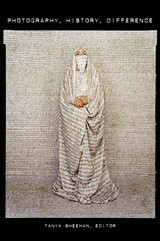
Photography, History, Difference
Edited by Tanya Sheehan
Dartmouth College Press, 2014
Over the past decade, historical studies of photography have embraced a variety of cultural and disciplinary approaches to the medium, while shedding light on non-Western, vernacular, and “other” photographic practices outside the Euro-American canon. Photography, History, Difference brings together an international group of scholars to reflect on contemporary efforts to take a different approach to photography and its histories. What are the benefits and challenges of writing a consolidated, global history of photography? How do they compare with those of producing more circumscribed regional or thematic histories? In what ways does the recent emphasis on geographic and national specificity encourage or exclude attention to other forms of difference, such as race, class, gender, and sexuality? Do studies of “other” photographies ultimately necessitate the adoption of nontraditional methodologies, or are there contexts in which such differentiation can be intellectually unproductive and politically suspect? The contributors to the volume explore these and other questions through historical case studies; interpretive surveys of recent historiography, criticism, and museum practices; and creative proposals to rethink the connections between photography, history, and difference. A thought-provoking collection of essays that represents new ways of thinking about photography and its histories. It will appeal to a broad readership among those interested in art history, visual culture, media studies, and social history.
[more]
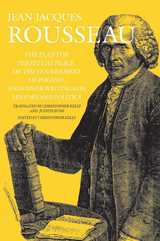
The Plan for Perpetual Peace, On the Government of Poland, and Other Writings on History and Politics
Jean-Jacques Rousseau
Dartmouth College Press, 2011
These abridgements of The Plan for Perpetual Peace (published 1761), On the Government of Poland (1771–1772), and Jean-Jacques Rousseau’s other writings on history and politics represent his considerations of the practical applications of key principles developed in his best-known theoretical writings. In this latest volume in the classic series, Rousseau reflects on projects for a European union; the possibilities for governmental reform for France, including the polysynody experiment; international relations; and the establishment of governments for Poland and Corsica, both recently liberated from foreign oppression. Taken together, these works offer definitive insights into Rousseau’s decidedly nonutopian thoughts on cosmopolitanism and nationalism, and on the theory and practice of politics.
[more]
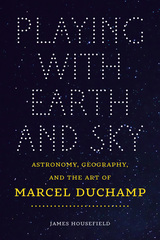
Playing with Earth and Sky
Astronomy, Geography, and the Art of Marcel Duchamp
James Housefield
Dartmouth College Press, 2016
Playing with Earth and Sky reveals the significance astronomy, geography, and aviation had for Marcel Duchamp—widely regarded as the most influential artist of the past fifty years. Duchamp transformed modern art by abandoning unique art objects in favor of experiences that could be both embodied and cerebral. This illuminating study offers new interpretations of Duchamp’s momentous works, from readymades to the early performance art of shaving a comet in his hair. It demonstrates how the immersive spaces and narrative environments of popular science, from museums to the modern planetarium, prepared paths for Duchamp’s nonretinal art. By situating Duchamp’s career within the transatlantic cultural contexts of Dadaism and Surrealism, this book enriches contemporary debates about the historical relationship between art and science. This truly original study will appeal to a broad readership in art history and cultural studies.
[more]
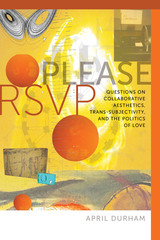
Please RSVP
Questions on Collaborative Aesthetics, Trans-Subjectivity, and the Politics of Love
April Durham
Dartmouth College Press, 2019
It’s no secret that working with others, rather than alone, on a creative project can often yield the most unexpected results, a new and surprising sum greater than the whole of its parts. Please RSVP presents a bold new theory of just how powerful collaboration can be in the making of art. April Durham argues that collaborative activity has the potential to broaden and expand an individual participant’s static identity through what she calls “trans-subjectivity.” She offers a fine-grained analysis of the ways in which personal subjectivity becomes porous and malleable during the process of shared creative labor. Durham’s concept of the trans-subjective offers a new way to come to terms with the networks, either digital or otherwise, that have developed over the twentieth- and twenty-first centuries, providing a bold new frame for topics like the experience of time, community, language, and ethics. This is a crucial and eye-opening book for contemporary artists and art historians alike.
[more]
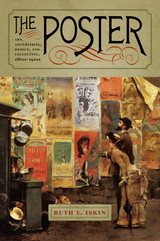
The Poster
Art, Advertising, Design, and Collecting, 1860s–1900s
Ruth E. Iskin
Dartmouth College Press, 2014
The Poster: Art, Advertising, Design, and Collecting, 1860s–1900s is a cultural history that situates the poster at the crossroads of art, design, advertising, and collecting. Though international in scope, the book focuses especially on France and England. Ruth E. Iskin argues that the avant-garde poster and the original art print played an important role in the development of a modernist language of art in the 1890s, as well as in the adaptation of art to an era of mass media. She moreover contends that this new form of visual communication fundamentally redefined relations between word and image: poster designers embedded words within the graphic, rather than using images to illustrate a text. Posters had to function as effective advertising in the hectic environment of the urban street. Even though initially commissioned as advertisements, they were soon coveted by collectors. Iskin introduces readers to the late nineteenth-century “iconophile”—a new type of collector/curator/archivist who discovered in poster collecting an ephemeral archaeology of modernity. Bridging the separation between the fields of art, design, advertising, and collecting, Iskin’s insightful study proposes that the poster played a constitutive role in the modern culture of spectacle. This stunningly illustrated book will appeal to art historians and students of visual culture, as well as social and cultural history, media, design, and advertising.
[more]
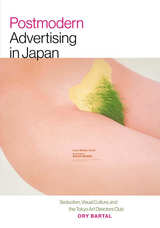
Postmodern Advertising in Japan
Seduction, Visual Culture, and the Tokyo Art Directors Club
Ory Bartal
Dartmouth College Press, 2015
In a study driven by stunning images of Japanese advertisements and the artworks they quote from, Ory Bartal offers a first-of-its-kind interpretation of the “postmodern” genre of advertising in Japan, which both shaped and reflected the new consumer-driven culture that arose during the bubble era of the 1980s and 1990s. Through a fascinating tale of art directors and their works and influences, Bartal shows how this postmodern visual language, like postmodernism in other streams, is distinguished by its mélange of styles, blurring of boundaries between art and design, and reliance on visual and textual quotations from sources past and present, domestic and foreign. Although this advertising culture partakes of global trends, Bartal draws attention to the varied local artistic sensibilities, structures of thought, and underlying practices, challenging the often-simplistic characterization of “Japaneseness” as being rooted in a Zen tradition of aesthetic indirectness and ambiguity. Combining multilingual scholarship with a wealth of information gleaned through years of personal interviews with the principals involved, this is a truly original contribution to the discussion of Japanese art and advertising as well as an insightful reading of more general issues in the study of visual culture and media.
[more]
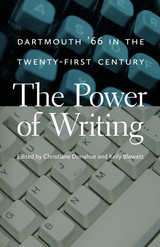
The Power of Writing
Dartmouth '66 in the Twenty-First Century
Edited by Christiane Donahue and Kelly Blewett
Dartmouth College Press, 2015
At the 1966 Dartmouth Seminar, scholars gathered to debate the direction of English Studies in the academy. This debate had far-reaching effects and arguably forever changed writing instruction in the United States. To commemorate the 45th anniversary of this gathering, Dartmouth College hosted an event both celebrating the past and looking toward the future. Then as now, there is this simple truth: writing well matters, and it matters in institutions of higher education across disciplines. Yet what it means to be a good writer in the academy and in the public sphere remains a site of controversy and discussion. The Power of Writing: Dartmouth ’66 in the Twenty-First Century argues that any discussion of why writing well matters should extend beyond composition and rhetoric scholars to capture the knowledge that outstanding teachers and writers themselves put to work every day. The editors have brought together scholars and public intellectuals (including New York Times best-selling authors David McCullough and Steve Strogatz) from the sciences, social sciences, humanities, and interdisciplinary fields to engage in a dialogue about some of the controversial questions related to writing today. Readers will engage with questions about what it means to write well and how different answers affect the teaching and learning of writing in higher education. Each anchor article—representing disciplines as varied as musicology, African studies, mathematics, and history—receives responses from Dartmouth faculty and nationally renowned faculty members in writing studies programs. This timely and wide-ranging collection will have appeal far beyond writing instructors and is specifically designed for readers across disciplines.
[more]
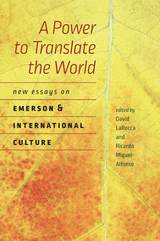
A Power to Translate the World
New Essays on Emerson and International Culture
Edited by David LaRocca and Ricardo Miguel-Alfonso
Dartmouth College Press, 2016
This thought-provoking collection gathers a roster of seasoned Emerson scholars to address anew the way non-American writers and texts influenced Emerson, while also discussing the manner in which Emerson’s writings influenced a diverse array of non-American authors. This volume includes new, original, and engaging research on crucial topics that have for the most part been absent from recent critical literature. While the motivations for this project will be familiar to scholars of literary studies and the history of philosophy, its topics, themes, and texts are distinctly novel. A Power to Translate the World provides a touchstone for a new generation of scholars trying to orient themselves to Emerson’s ongoing relevance to global literature and philosophy.
[more]
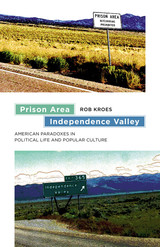
Prison Area, Independence Valley
American Paradoxes in Political Life and Popular Culture
Rob Kroes
Dartmouth College Press, 2015
The study of prisons brought Tocqueville to America. For Rob Kroes, one of Europe’s most distinguished authorities on contemporary American culture, it was rather the other way around. For Kroes, it was deep knowledge of American culture that brought him back to America and face to face with a couple of highway signs, Tocquevillian in their portent, that invited motorists to exit from Interstate 80 in Nevada toward a place called Independence Valley and to keep their eyes open for a “Prison Area.” In this collection of essays, Kroes invites us to take these two signs seriously for their capacity to deepen our insights into America’s cultural contradictions, especially how, after the September 11, 2001, attacks on the World Trade Center and Pentagon, the US government’s response altered the meaning of America for Americans and Europeans alike. The author’s fascination with the myriad ways in which America changes face, from hard power to soft, from uses of force to the power of entertainment, but always holding the attention of publics across the globe, is what ties his work together. The essays here touch on diverse topics such as photography (“Falling Man” and Holocaust imagery), music (in Broadway and Hollywood musicals), film (Django Unchained), American exceptionalism (in an interesting counter to dog-eared dogma), and the difficulties of the first “white president of color.” Like his predecessors, Tocqueville and Johan Huizinga, Kroes offers a clear-eyed assessment of America on the ground, love it or hate it. This readable and sharp-penned critique of America and American culture and power will appeal to Americanists across a broad swath of disciplines.
[more]
READERS
Browse our collection.
PUBLISHERS
See BiblioVault's publisher services.
STUDENT SERVICES
Files for college accessibility offices.
UChicago Accessibility Resources
home | accessibility | search | about | contact us
BiblioVault ® 2001 - 2024
The University of Chicago Press









